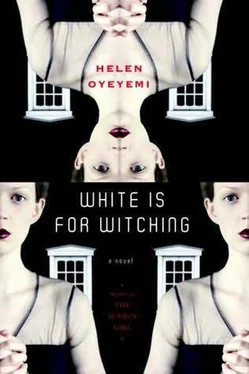“I’m thinking of the shame. To make a man hang himself. That place is a prison. You come without papers because you have been unable to prove that you are useful to anyone, and then when you arrive they put you in prison, and if you are unable to prove that you have suffered, they send you back. That place up there is a prison. He didn’t deserve that.”
“Yes,” said Miranda. She touched her own cheek, expecting it to be wet. It wasn’t.
Sade laid her hands down on the ironing board and stared at the plasters on her fingers. “I hate them,” she said, in a voice that seemed to include Miranda.
Miranda picked up her notes and said she was sorry from behind them. She left the larder quietly, walking backwards. She knew then that Sade had not personally known the dead man. Her grief was almost theoretical. It didn’t mean any less, but it was a different sort of grief from Miranda’s. It was the sort of grief you didn’t have to suppress because letting it out made it smaller instead of bigger. The sort of grief you could say something about because you instinctively understood that it could not continue, rigid inside your breathing apparatus like a metal stem. Miranda made a face at herself in the hallway mirror. Deep thoughts. Why didn’t she just draw a diagram of the different kinds of grief?
•
June was bread and nuts and berries. It was also uncharacteristically hot, but Eliot and Miranda didn’t let thoughts of summer come until after exams. Before exams came limbo, spent on the roof, squinting at old notes through sunglasses. Neither of them tanned in the slightest, though the sun’s heat brought into view messages they’d written to themselves in lemon juice on the margins of their pages. Miranda rotated her three halter-neck dresses. Eliot didn’t stoop to shorts, but folded up the bottoms of his jeans and wore flip-flops.
He got through the exam period on the “brain bread” that Luc baked — the loaves were round and coarse and filled with all sorts of seeds that neither of the twins had heard of. It seemed that every time Miranda looked at Eliot he had some of that bread in his mouth — with Luc’s champagne marmalade, or mackerel, or honey, or butter. Miranda tried not to judge him, but it was hard. In revision sessions at school, Eliot leaned forward and answered the teacher’s questions around a wad of bread. The Sunday before their last set of exams, Miranda and Eliot tested each other on key dates and terms beneath a giant picnic umbrella in the garden. Miranda’s last module was for her history paper; Eliot’s was for politics. They answered so many of their practice questions correctly that it seemed like a jinx.
Sade sat at the other end of the garden, by the back door, in case she was called. For months she had been knitting something white that grew wider and longer. She didn’t seem to have a final form in mind for it. It lathered her lap like beaten egg white, full of sun, and she paused to brush leaves off it. As she worked she lowered her head and hummed, smiling as if the work was for someone she thought tenderly of.
“What will you do when it’s really summer?” Miranda asked Eliot.
When Sade glanced over, she picked up the thick smoothie that Sade had blended for her and pretended to drink. She let the fruit sit on her lips, then, when Sade looked away, she wiped it off. Her heart wasn’t in the subterfuge. The summer before last, Eliot had refused to go on holiday without Lily and spent much of August up on the roof wearing a black balaclava and writing poetry, which he then balled up and threw as far and as hard as he could, in various directions. Lily, contacted in Mumbai, had said that he was clearly exploring the role of the poet as incendiary. When she came home she’d advised that Eliot cut his hair, unless he preferred cheaply acquired androgyny.
“Will you go to South Africa straight away?” Miranda asked.
Eliot drank from her glass and suddenly half her smoothie was gone.
“Thanks,” she said.
“South Africa’s not until October,” Eliot told her. Perhaps he would spend summer on the roof again, then.
“What will you do when it’s summer?” he asked.
Miranda had spent the previous weekend looking through her GrandAnna’s prudent, economical knitting and sewing patterns, and she felt sorry for the old black Singer sewing machine, which seemed never to have had any fun.
“First I will knit you a scarf, as I’ve read that South Africa won’t really get warm for you until November. Next I think I will make myself an overcoat, with a violently coloured lining.”
•
After their last exam, Eliot vanished with a group of friends whose schoolbags clanked with bottles, while Miranda went straight home and returned the notes she’d taken to school to the bundle beneath her bed. She had not answered many of her exam questions completely — she had too much to tell the examiner, and everything she had to say was of the greatest urgency. She’d been reduced to summarising points for the final questions, to give illusions of answers.
Miranda found Sade and they went down to London together, in search of suitable scarf and coat fabrics at Petticoat Lane Market. Miranda liked the market very much. It was steps away from a main street full of fast-food restaurants, a street that glowed with buses like wheeled danger signs, but the market itself smelt like fried spice and flour and the musk of cloth before it is ever worn.
Sade bought a brown bag full of peppers more wizened and vicious-looking than chillies, tie-dyed fabric, and a pair of square-toed silver shoes with diamanté buckles that silenced Miranda for a full ten minutes. There was no time or place or event fancy enough for those shoes. She knew that Sade would have to wear them as house slippers.
Miranda bought plenty of purple thread and some unassuming polyester and viscose mix that fell well and warmly when she held a sample length of it up against herself. She decided that she wanted her overcoat to be a full frock coat, and got some black petticoat gauze too. Then Sade persuaded her to buy a big square of red and purple tie-dyed into shadowy mandalas. “For your violently coloured lining,” Sade said, as they held the cloth out between them and gaped at it and then at each other. There was too much cloth, but that was a good thing, as Miranda had not yet learnt to sew with a machine and was bound to get it horribly wrong at first.
Sade and Miranda paid for the fabric and the silver shoes together, and the shop owner bantered with Sade while finding her change, peppering his talk with Yoruba words as he wrapped the cloth in tissue paper. He was Indian. He saw Miranda’s surprise and laughed. “Why wouldn’t I know some of this lady’s language? My best customers are Yoruba…”
He also let them take, for only ten pounds, a mannequin that he no longer used because it was too old and he’d had too many complaints about its proportions from his mainly full-figured female customers. The mannequin had no hair, no face, was very white under a film of grime, and had a fifties waist and a nonexistent bust, which pleased Miranda because that way she would be able to see how the coat would look on her even as it was being made.
At home, she put the mannequin in the bath and washed it with a flannel, from face to torso to heels, until it was completely clean. The mannequin was taller than her, but as she pulled it out of the bath by its hands, she felt as if she was its mother. In her room she covered the mannequin’s nakedness with one of the long T-shirts she slept in. The mannequin stood beside her wardrobe, arms at its sides, looking cowed somehow.
Miranda put a knitted hat on its head and started work on her coat. The lack of light in her room made it the coolest part of the house. She had her windows open beneath the closed curtains, and humidity drew the curtains and the window together, giving the impression of a gaunt head looking out of her wall. Its skin was loose, and it gasped vacantly.
Читать дальше












